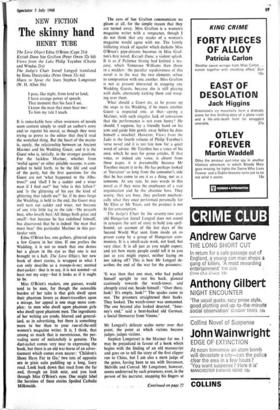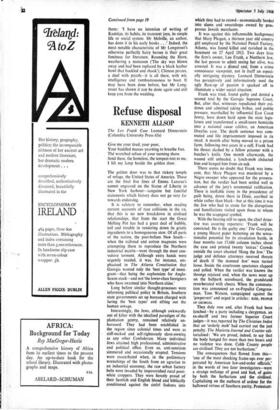NEW FICTION
The skinny hand
HENRY TUBE
The Love Object Edna O'Brien (Cape 21s) Keziah Dane Sue Grafton (Peter Owen 32s 6d) Views frotn the Lake Philip Toynbee (Chatto and Windus 21s) The Judge's Chair Jozsef Lengyel translated by Ilona Duczytiska (Peter Owen 32s 6d) Masts to Spear the Stars Stephen Longstreet (W. H. Allen 30s)
I pass, like night, from land to land; I have strange power of speech; That moment that his face I see, I know the man that must hear me: To him my tale I teach.
It is remarkable how often reviewers of novels seem content simply to retell an author's story and/or repoint his moral, as though they were trying to prove to the editor that they'd read the wretched thing. But the heart of the matter is, surely, the relationship between an Ancient Mariner and his Wedding Guest; and it is the Guest who is, initially, in the stronger position. For the luckless Mariner, whether from 'woful agony' or other pitiable reasons, is com- pelled to hold forth, to be the life and soul of the party, but the first questions for the Guest are not 'what happened to the Alba- tross?' and 'shall I be a sadder and a wiser man if I find out?' but 'who is this fellow?' and 'is the glittering of his eye the kind of glittering that taketh me?' So, if he does forgo the Wedding, is held to the end, the Guest may well turn out sadder and wiser, not because of any trite little tag to the tale—'He prayeth best, who loveth best/All things both great and small'--but because he has redefined himself, has discovered that he is indeed 'the man that must hear' this particular Mariner in this par- ticular vein.
Edna O'Brien has, one gathers, glittered quite a few Guests in her time. If one prefers the Wedding, it is not so much that one denies her a gleam in the eye as that one is not brought to a halt. The Love Object, her new book of short stories, is wrapped in what I can only describe as a trotnpe-le-nez scented dust-jacket: that is to say, it is not scented—at least not my copy—but it looks as if it ought to be.
Miss O'Brien's readers, one guesses, would tend to be men, for though the ostensible burden of her tales is that girls dwell upon their phantom lovers as desert-travellers upon a mirage, her appeal is one stage more com- plex: to men who dwell upon phantom girls who dwell upon phantom men. The ingredients of her writing are crude, blurred and general- ised, as in advertising, but there is something more to her than to your run-of-the-mill women's magazine writer. It is, I think, that among so much that is meretricious, the per- vading scent of melancholy is genuine. The dust-jacket comes very near to expressing the book, but there is an old war-horse of an adver- tisement which comes even nearer: 'Children's Shoes Have Far to Go,' two tots of opposite sex in pixie suits paddling up a long, faery road. Look back down that road from the far end, through an Irish mist, and you look through Miss O'Brien's eyes. One might label the heroines of these stories Spoiled Catholic Milkmaids.
The eyes of Sue Grafton communicate no gleam at all, for the simple reason that they are turned away. Miss Grafton is a women's magazine writer with a vengeance, though I do not think that any reader of a women's magazine would agree with me. The faintly titillating streak of squalor which darkens Miss O'Brien's pipe-dreams becomes in Miss Graf- ton's first novel, Keziah Dane, a violent splash. It is as if Patience Strong had knitted a tea- cosy. which Tennessee Williams then threw in a midden: the peculiar repulsiveness of this novel is in the way the two elements refuse to compromise with one another. Miss Grafton is not at present interested in stopping any Wedding Guests, because she is still playing with dolls. alternately kicking them and weep- ing over them.
What should a Guest do, as he passes up the steps to his Wedding, if he meets another Guest--a respected one, at that— apeing a Mariner, with such singular lack of conviction that the performance is not even funny? He should, I suppose, lay a friendly hand on his arm and guide him gently away before he does himself a mischief. However, Views from the Lake is the fourth volume of Philip Toynbee's verse novel and it is too late now for a quiet word of advice. Mr Toynbee has a voice of his own, which he uses for prose articles. If that voice, or indeed any voice, is absent from these pages, it is presumably because Mr Toynbee meant it to be. He has perhaps looked at 'literature' so long from the consumer's side that he has come to see it as a thing, not as a someone. At any rate, he uses words in this novel as if they were the employees of a vast organisation and he the absentee boss. They scurry, they are busy, they perform mechani- cally what they once performed personally for Mr Eliot or Mr Yeats, and the product is not fit for consumption.
The Judge's Chair by the seventy-two year old Hungarian Jozsef Lengyel does not sound in synopsis the sort of story to hold you spell- bound; an account of the last days of the Second World War seen from inside an ss prison camp by a group of Hungarian com- munists. It is a small-scale work, not loud, but very clear. It is all just as you might expect, and yet how many people could tell it to you just as you might expect, neither laying on nor taking off? This is how Mr Lengyel de- scribes the end of the war for the prisoners: 'It was then that one man, who had pulled himself upright to rest his back, glanced cautiously towards the watch-tower, and abruptly cried out, beside himself : "Over there, look! It's empty, look!" The spades came to rest. The prisoners straightened their backs. They looked. The watch-tower was unmanned. The one beyond also looked deserted. "Jour- ney's end," said a bent-backed old German, a Social Democrat from Vienna.'
Mr Lengyel's delicate scales teeter over that point, the point at which victims become judges, judges victims.
Stephen Longstreet is the Mariner for me. I may be prejudiced in favour of a book which begins with the finding of an old manuscript and goes on to tell the story of the first clipper run to China, but I am also a stern judge of the genre, having been to sea with Stevenson, Melville and Conrad. Mr Longstreet, however, seems undeterred by such presences, even, in the person of his narrator, snapping his fingers at
Continued on page 22 Continued from page 19 them: 'I have no intention of writing of Kadekjo, its habits, its transient joys, its simple life or social system. Mr Melville, an author, has done it in his early books . . Indeed, the most notable characteristic of Mr Longstreees otherwise perfectly hairy heroes is their great fondness for literature. Rounding the Horn, weathering a monsoon (The sky was blown away and had been replaced by a black leather bowl that buckled and shook'),-Chinese pirates, a duel with pistols—it is all there, with wit, intelligence and rumbustiousness to boot. It may have been done before, but Mr Long- street has shown it can be done again and still keep you from the wedding.











































 Previous page
Previous page